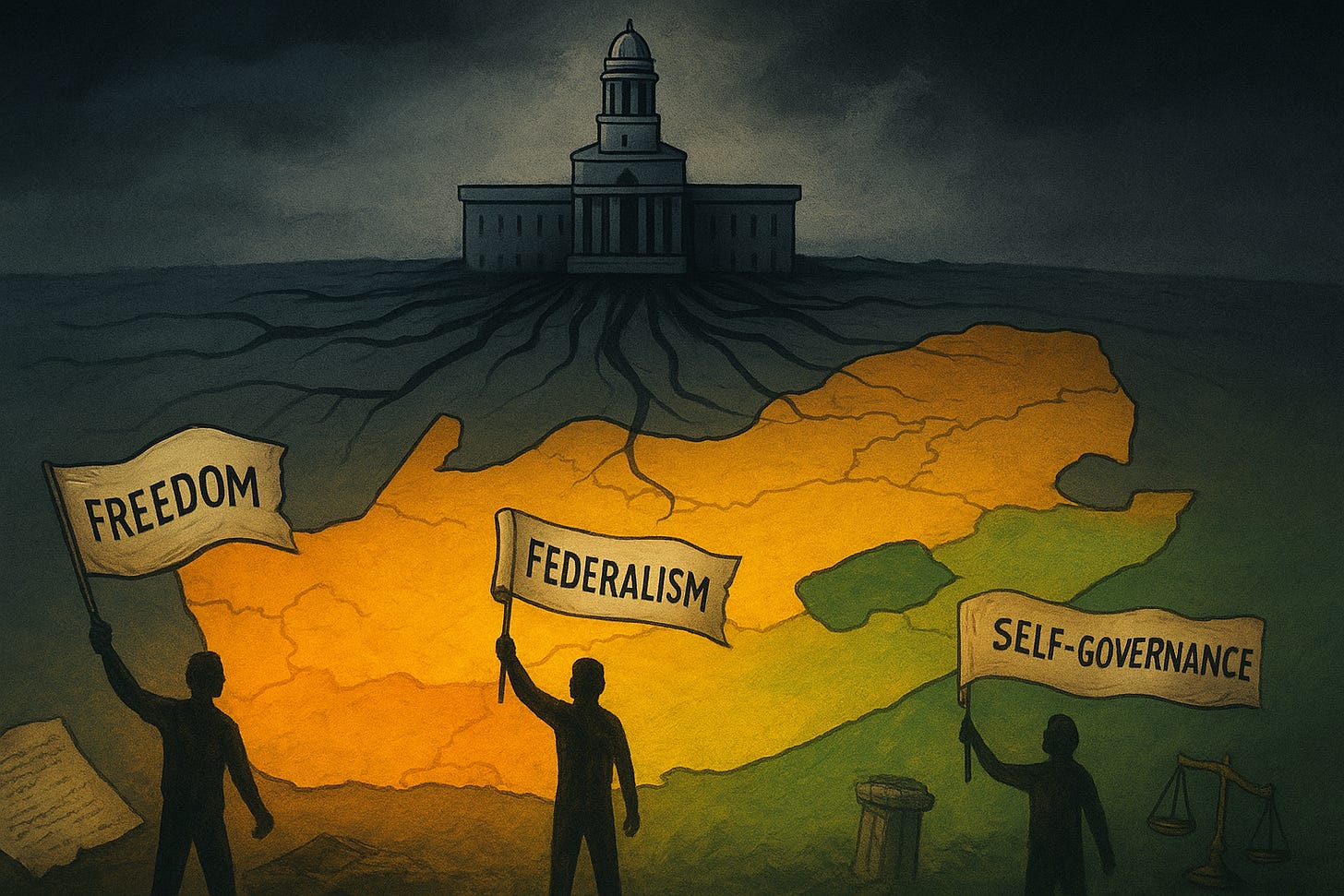The Limits of Constitutionalism in a Unitary State
There can be no genuine freedom when people are dictated to by a distant central government they do not support, and which doesn’t align with their values.
The resurgence of federalism in South African public discourse in recent years is a highly positive development that suggests that some communities have always been alive to the limits of constitutionalism within a unitary state.
When the late FW De Klerk and others paraded the constitution as a safeguard against majoritarianism after the so-called “miracle” transition of the 90s, these communities were concerned because they understood that Pretoria still held enormous power and that centralisation would bind them to the will of the majority.
Notwithstanding the supremacy of the constitution and its protection of key freedoms, they also appreciated the fact that the judiciary could be infiltrated by actors who could subvert these protections and inadvertently advance the interests of the political elite in Pretoria.
As they anticipated, constitutionalism has increasingly revealed its limitations in a context where a single, central government holds a disproportionate share of power.
Over the past year, the political elite in Pretoria has wielded its centralised power to push through illiberal laws that do not reflect the values of these communities and that threaten to erode their core freedoms. Chief among these are the Basic Education Laws Amendment (BELA), National Health Insurance (NHI), and the Expropriation Act.
BELA is a malicious attempt to undermine mother tongue education, NHI is a thinly veiled project to socialise healthcare, and the pitfalls of the Expropriation Act have already been exposed in the case of the development property in the City of Ekurhuleni.
The judiciary has failed to block any of these laws because, at best, it is populated by actors who fear being seen as undermining democracy, and at worst, by actors aligned with or sympathetic to the overarching ideology of the ruling elite.
To be sure, this is not an attack on constitutionalism. It remains important in South Africa, and it has played an indispensable role in constraining the power of the ruling elite in Pretoria to some degree. But as I have already noted, it is a thin line of defence in a system where ultimate power is concentrated in the hands of a few.
With illiberal organisations like the uMkhonto we Sizwe (MK) championing parliamentary democracy as an alternative to advance their objectives, it is not difficult to imagine a future where constitutionalism becomes virtually toothless.
Federalism is thus a viable alternative because it can dismantle Pretoria’s monopoly on power and disperse it to regions that can gain greater autonomy to govern themselves according to their values. It can shield certain communities from the tyranny of majoritarianism by ensuring that a small political elite cannot impose its will on everyone else.
When a region has the power to make its own laws, it can avoid rubber-stamping illiberal measures that reflect the values of distant groups.
It is for this primary reason that the call for a federal system in South Africa must be supported. Ours is a diverse country, and a melting pot of cultures and values. Whatever political system we adopt must reflect this reality rather than impose a one-size-fits-all model from the top.
There can be no genuine freedom when people are dictated to by a distant central government they do not support, and which doesn’t align with their values. True freedom lies in self-determination and the ability of communities to govern their own affairs.
The racism charge used to discredit federalism has grown tired and must be challenged. Granting communities greater freedom to govern themselves, while reducing the power of Pretoria’s elites, is not a revival of Apartheid. If anything, it is centralisation that bears a closer resemblance to Apartheid, because that system was rigidly centralised.
Apartheid weaponised difference in pursuit of a social-engineering project. Federalism, by contrast, recognises diversity and seeks to accommodate it politically. In South Africa’s case, it acknowledges that we are not one nation, but many nations within one state.
Ultimately, federalism offers a genuine safeguard for communities in South Africa against the tyranny of majoritarianism. It gives them the freedom to govern themselves without being forced to conform to the agenda of political elites in Pretoria.
Constitutionalism remains vital and will always be central to liberalism, but it must be complemented by a political system that grants people tangible freedom.
Ayanda Sakhile Zulu holds a BSocSci in Political Studies from the University of Pretoria and is an intern at the Free Market Foundation.





Good article, I agree. But you won't get federalism by pushing for federalism, the government needs to feel that the options are federalism or secession. This is the genius of what Phil Craig is doing (I think he is ultimately a federalist).
In South Africa, taking our queue from American and Swiss constitutional design, I think we need a philosophy of constitutionalism that recognises a few things:
1. Nice words mean nothing, what matters is actually giving power to competing institutions in society that can check each other.
2. If we decentralise, to avoid a gradual centralisation (see America), the constituent parts must always have the explicit right to secede.
3. For the right in 2. to be meaningful, remembering point 1., the constituent parts must maintain their own militias/militaries and police, and be responsible for collecting their own taxes.
So given all of these points, it's clear there's no way government will ever accept this without a credible threat of secession. This is why I am a convert to Cape and other secession movements in SA.
I am in violent agreement with this. There is no other way.